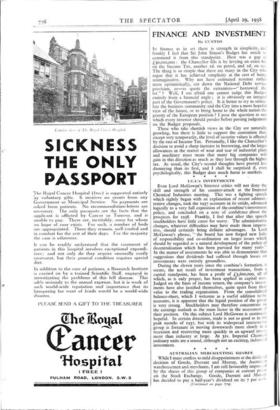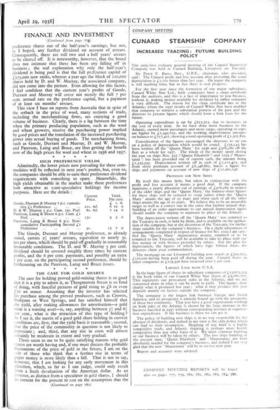AUSTRALIAN MERCHANTING SHARES
While I must confess to mild disappointment at the divide lad decision of Goode, Durrant and Murray, the Austral.-n warehousemen and merchants, I am still favourably impres- by the shares of this group of companies at current prices on the Stock Exchange. Goode, Durrant and Muri ay has decided to pay a half-year's dividend on its 7 per cent.
(Confirmed Olt page 779) FINANCE AND INVESTMENT (Continued from page 776) preference shares out of the half-year's earnings, but not, as I hoped, any further dividend on account of arrears. Consequently, there are still two and a half years' arrears to be cleared off. It is noteworthy, however, that the board does not intimate that there has been any falling off in business ; the real explanation why only the half-year's dividend is being paid is that the full preference capital of £275,000 now ranks, whereas a year ago the block of i to,000 shares held by D. and W. Murray, the associated company, did not come into the picture. Even allowing for this factor, I feel confident that the current year's profits of Goode, Durrant and Murray will cover not merely the full 7 per cent. annual rate on the preference capital, but a payment of at least six months' arrears.
This view I base on reports from Australia that in spite of the setback in the price of wool, many sections of trade, including the merchandising firms, are enjoying a good volume of business. Clearly, there is a lag between the time when the primary producing population, such as the wool and wheat growers receive the purchasing power implied by good prices and the translation of the increased purchasing power into actual buying of goods. The merchanting firms, such as Goode, Durrant and Murray, D. and W. Murray, and Paterson, Laing and Bruce, are thus getting the benefit now of the high prices for wool and wheat in 1936 and 1937. * * * *



























































 Previous page
Previous page